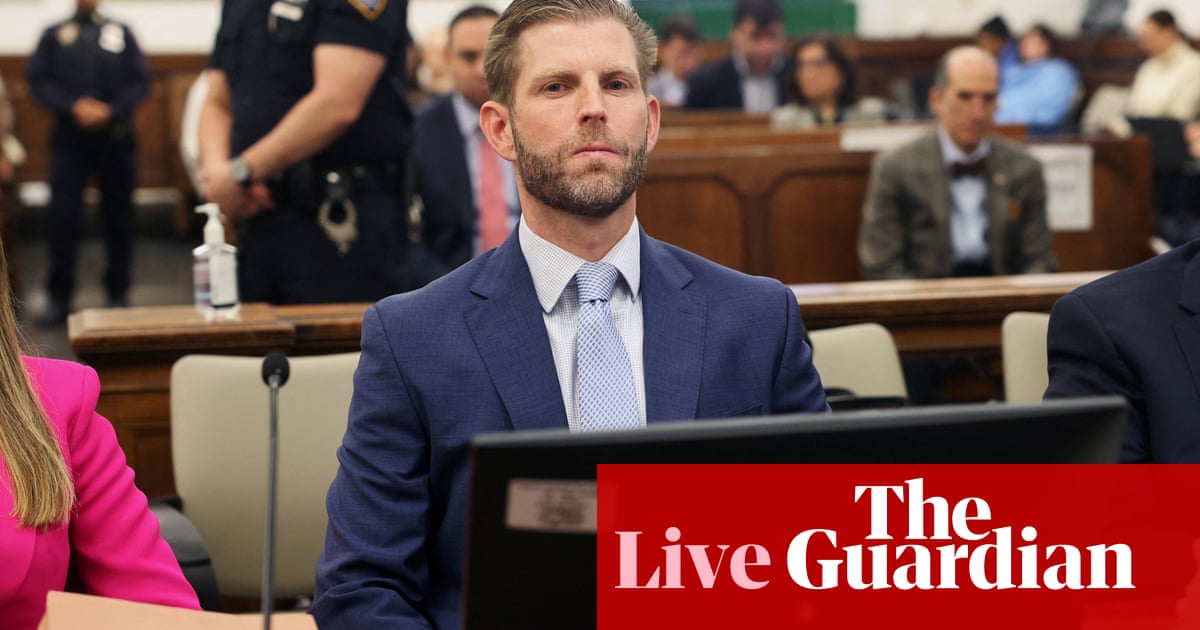
House panel: Trump criminal referral a "roadmap to justice"
The House panel investigating Donald Trump’s efforts to overturn his 2020 election defeat has referred the former president for four criminal charges, including engaging in an insurrection, in what the committee’s chair says is a “roadmap to justice”.
The stunning, unprecedented referral of an ex-president came at the final meeting of the bipartisan panel on Monday afternoon. The nine members also voted unanimously to approve the final report of the 18-month investigation, which will be released on Wednesday.
The committee alleged violations of four criminal statutes by Trump, in both the run-up to the January riot and during his efforts to remain in power after his defeat by Joe Biden.
The panel is also referring four Republican members of Congress to the House ethics committee for refusing to comply with subpoenas.
The Trump referrals are for “influencing or impeding a an official proceeding of the US government”, “conspiring to defraud the US”, “unlawfully, knowingly or willingly making false statements to the federal government”, and “assisting or engaging in insurrection against the United States”.
Mississippi Democrat Bennie Thompson, the panel chair, said the referrals will be transmitted to the justice department in very short order.
They are largely symbolic, as attorney general Merrick Garland will make his own decision on charges at the conclusion of the justice department’s own investigations, headed by special prosecutor Jack Smith.
But, speaking to CNN after the session, Thompson said:
I’m convinced the justice department will charge former president Trump. No-one, including the former president, is above the law.
In his opening remarks to the meeting, Thompson said: “We have every confidence that the work of this committee will help provide a roadmap to justice.”
John Eastman, Trump’s attorney, whom the panel said had helped Trump in his conspiracy to stay in power, was also referred. Unnamed others are also likely to face referrals, including former chief of staff Mark Meadows, Trump’s personal attorney Rudy Giuliani, and former department of justice official Jeffrey Clark.
Maryland Democrat Jamie Raskin announced the referrals. “Ours is not a system where foot soldiers go to jail, and the masterminds and ringleaders get a free pass,” Raskin said:
The president has an affirmative and primary constitutional duty to act to take care that the laws be faithfully executed. Nothing could be a greater betrayal of this duty than to assist in insurrection against the constitutional order.
Evening news summary
We’re wrapping up our live US politics coverage for the day, after a historic announcement from the January 6 committee that they had voted unanimously to refer former president Donald Trump to the justice department for criminal prosecution on four counts. Here’s a recap of today’s key events:
The four counts of the Trump referrals are for “influencing or impeding an official proceeding of the US government”, “conspiring to defraud the US”, “unlawfully, knowingly or willingly making false statements to the federal government”, and “assisting or engaging in insurrection against the United States”.
The referrals are largely symbolic, as attorney general Merrick Garland will make his own decision on charges at the conclusion of the justice department’s own investigations, headed by special prosecutor Jack Smith.
The panel is also referring four Republican members of Congress to the House ethics committee for refusing to comply with subpoenas, including Kevin McCarthy, the GOP leader who is expected to run for speaker of the House when the party takes control of the chamber next year.
The January 6 committee’s full report is expected to be released on Wednesday.
In other high-stakes news, the supreme court’s chief justice, John Roberts, has temporarily blocked the Biden administration from later this week ending a pandemic-era policy of rapidly expelling migrants caught at the US-Mexico border, at the request of Republican officials in 19 states.
What’s next for the Jan 6 committee?
Though the committee has released an executive summary of its findings, a full report is expected to be made public on Wednesday.
Broader documentation of the committee’s interviews with more than 1,000 witnesses are also expected to be made public in the coming days, CNN reported, satisfying the demands from Trump’s allies to see not just the committee’s clips from interviews with Trump’s confidantes, but the full context.
The committee itself will dissolve, with Republicans holding a majority in Congress next year. Four members of the committee will not be returning to Congress, having lost or chosen not to run for reelection in the midterms. Despite its historic work, the committee “is unlikely to serve as a political steppingstone for many of its members”, the New York Times wrote.
It’s unclear how the committee’s recommendation that Trump should face criminal justice will affect the justice department’s ongoing criminal investigations into Trump’s conduct on 6 January and his handling of top secret documents. Now that Trump is officially running for reelection, the justice department has appointed a special counsel, Jack Smith, a career prosecutor and political independent, to oversee those investigations.
Breaking: supreme court’s chief justice temporarily blocks end to pandemic-era border restrictions
At the request of Republican officials in 19 states, the supreme court’s chief justice, John Roberts, has temporarily blocked the Biden administration from later this week ending a pandemic-era policy of rapidly expelling migrants caught at the US-Mexico border, Reuters reports.
The Republican officials led by the attorneys general in Arizona and Louisiana on Monday asked the supreme court to act after a federal appeals court on Friday declined to put on hold a judge’s ruling last month that invalidated an emergency order known as Title 42. The policy is set to expire Wednesday.
The Biden administration had faced sharp criticism for extending Title 42, a Trump-era immigration policy that advocates said had made the legal process of seeking asylum in the US much more dangerous, unstable and unsanitary.
Since the policy was put in place in March 2020, more than 2.4 million migrants have been expelled from the US and prevented from exercising their legal right under US and international law to seek asylum. The policy was justified as a way of preventing the spread of Covid-19.
In November, a federal judge ordered the Biden administration to lift the Trump-era asylum restriction, calling the ban “arbitrary and capricious”. The judge gave the justice department five weeks to implement the change, “with great reluctance”, setting the deadline for this Wednesday, 21 December.
More than 9,000 threats against US lawmakers in past year, Capitol police chief says
As the January 6 committee has referred Donald Trump to the justice department for criminal prosecution on four counts, including “assisting or engaging in insurrection against the United States”, in another part of the Capitol, the chief of the Capitol police is testifying about the rising number of threats against members of Congress.
Unanswered questions, ‘unsolved crimes’: the 6 January pipe bombs
After more than a year of work, there are still key questions about 6 January that remain unanswered, including: who was responsible for placing the “viable” pipe bombs outside the Democratic and Republican national committee headquarters that were discovered that day?
Asked about that issue, congressman Jamie Raskin said “I don’t believe there have been any updates since we first looked into it. Those are unsolved crimes,” CNN reported.
January 6 committee Democrat who lost her House seat: ‘It’s all been worth it.’
This is Lois Beckett, picking up our live politics coverage from Los Angeles.
Democratic congresswoman Elaine Luria of Virginia, a member of the January 6 House committee, lost her reelection bid to her Republican opponent.
As Luria recapped the January 6 committee’s recommendations this afternoon, CNN’s Jake Tapper asked her if she thought the committee’s work had played a role in her loss.
Luria said she believed it had, but that she felt preventing another event like January 6 was more important than her individual political career.
“It’s all been worth it,” she said.
Luria also emphasized that the 2022 midterms more broadly had not produced a wave of victories for the most pro-Trump candidates, as the former president had hoped. “The most emphatic election deniers — they did not win,” she said.
Luria and other Democrats told the New York Times they believed the January 6 committee’s work had more importance for midterm voters than polls had indicated.
Four law enforcement officers who came under attack during the January 6 Capitol riot have just been on CNN, sharing their thoughts about the criminal referrals for Donald Trump handed down this afternoon by the January 6 House committee.
Daniel Hodges, DC Metropolitan Police:
It’s entirely appropriate. I don’t think anything is really surprising about the charges. The chatter was whether it would be meaningful at all for the committee to make these referrals and I think it is, even if it’s just symbolic.
Symbols have meanings, symbols of power, and, you know, future generations [will] look back and say that this branch of Congress, this branch of government, did the best they could to make accountability happen.
Michael Fanone, DC Metropolitan police:
I think it was appropriate having sat through each and every one of the committee’s hearings. This was the inevitable outcome. Again, you know, it is symbolic and it’s up to the Department of Justice, ultimately, to seek criminal accountability for those responsible for the January 6 insurrection.
Aquilino Gonell, US Capitol Police:
It’s been very meaningful to have that coming from Congress, given the amount of evidence that they uncovered, and it’s appropriate.
Harry Dunn, US Capitol Police:
I’m glad that they did it. But respectfully to the January 6 committee, it’s been two years. We knew what they announced today on January 7, 2021.
I really appreciate all the work that they’ve done and they’re continuing to do, and the justice department is doing. But I don’t even want to get into the what ifs if they don’t [charge Trump].
Here’s our full story about this afternoon’s House January 6 committee meeting that approved criminal referrals for Donald Trump. Chris Stein reports:
The January 6 committee has referred Donald Trump to the justice department to face criminal charges, accusing the former president of fomenting an insurrection and conspiring against the government over his attempt to subvert the outcome of the 2020 election, and the bloody attack on the US Capitol.
The committee’s referrals approved by its members Monday are the first time in American history that Congress has recommended charges against a former president. It comes after more than a year of investigation by the bipartisan House of Representatives panel tasked with understanding Trump’s plot to stop Joe Biden from taking office.
“The committee believes that more than sufficient evidence exists for a criminal referral of former President Trump for assisting or aiding and comforting those at the Capitol who engaged in a violent attack on the United States,” congressman Jamie Raskin said as the committee held its final public meeting.
“The committee has developed significant evidence that President Trump intended to disrupt the peaceful transition of power under our Constitution. The president has an affirmative and primary constitutional duty to act to take care that the laws be faithfully executed. Nothing could be a greater betrayal of this duty than to assist in insurrection against the constitutional order.”
The committee accused Trump of breaching four federal criminal statutes, including those relating to obstructing an official proceeding of Congress, assisting an insurrection and conspiring to defraud the United States. It also believed Trump committed seditious conspiracy — the same charge for which two members of the rightwing Oath Keepers militia group were found guilty of by a jury last month.
The lawmakers also referred four Republican House representatives to the chamber’s ethics committee. The group includes Kevin McCarthy, the GOP leader who is expected to run for speaker of the House when the party takes control of the chamber next year.
Trump "charges" carry potential 25-year prison term
Donald Trump could face up to 25 years in prison if he is convicted of the four criminal charges for which a House panel this afternoon referred him to the justice department.
The US code on assisting with or engaging in an insurrection allows for a sentence of up to 10 years, and disqualification from holding or running for “any office under the United States” for anyone convicted.
The former president announced his third run for the White House as a Republican last month.
As for the other three charges Trump could face, all carry prison terms of up to five years, “conspiracy to defraud the US”, “unlawfully, knowingly or willingly making false statements to the federal government”; and “influencing or impeding a an official proceeding of the US government”.
There is, of course, uncertainty over whether the justice department will charge Trump with these crimes, far more whether he would be convicted. But this is the first time we know of the potential penalties Trump faces for his efforts to overturn the 2020 election.
January 6 panel releases executive summary of its findings
We’ll see the full report (hopefully) on Wednesday, but here’s the executive summary of the January 6 House panel’s findings, published this afternoon at the conclusion of its final meeting.
It gives an outline of the 18-month investigation and key findings that resulted in a criminal referral for Donald Trump on four federal charges today, including assisting in or engaging in an insurrection.
You can read the panel’s summary here.
House panel: Trump criminal referral a "roadmap to justice"
The House panel investigating Donald Trump’s efforts to overturn his 2020 election defeat has referred the former president for four criminal charges, including engaging in an insurrection, in what the committee’s chair says is a “roadmap to justice”.
The stunning, unprecedented referral of an ex-president came at the final meeting of the bipartisan panel on Monday afternoon. The nine members also voted unanimously to approve the final report of the 18-month investigation, which will be released on Wednesday.
The committee alleged violations of four criminal statutes by Trump, in both the run-up to the January riot and during his efforts to remain in power after his defeat by Joe Biden.
The panel is also referring four Republican members of Congress to the House ethics committee for refusing to comply with subpoenas.
The Trump referrals are for “influencing or impeding a an official proceeding of the US government”, “conspiring to defraud the US”, “unlawfully, knowingly or willingly making false statements to the federal government”, and “assisting or engaging in insurrection against the United States”.
Mississippi Democrat Bennie Thompson, the panel chair, said the referrals will be transmitted to the justice department in very short order.
They are largely symbolic, as attorney general Merrick Garland will make his own decision on charges at the conclusion of the justice department’s own investigations, headed by special prosecutor Jack Smith.
But, speaking to CNN after the session, Thompson said:
I’m convinced the justice department will charge former president Trump. No-one, including the former president, is above the law.
In his opening remarks to the meeting, Thompson said: “We have every confidence that the work of this committee will help provide a roadmap to justice.”
John Eastman, Trump’s attorney, whom the panel said had helped Trump in his conspiracy to stay in power, was also referred. Unnamed others are also likely to face referrals, including former chief of staff Mark Meadows, Trump’s personal attorney Rudy Giuliani, and former department of justice official Jeffrey Clark.
Maryland Democrat Jamie Raskin announced the referrals. “Ours is not a system where foot soldiers go to jail, and the masterminds and ringleaders get a free pass,” Raskin said:
The president has an affirmative and primary constitutional duty to act to take care that the laws be faithfully executed. Nothing could be a greater betrayal of this duty than to assist in insurrection against the constitutional order.
The four Republican congressmen who have been referred to the House ethics committee for refusing to comply with the January 6 panel’s subpoenas are Kevin McCarthy, the House minority leader and would-be speaker from California; Jim Jordan of Ohio; Scott Perry of Pennsylvania and Andy Biggs of Arizona.
January 6 panel approves final report, adjourns
The final act of the members of the January 6 House panel was to vote unanimously to approve its final report, which will be released on Wednesday.
But the “wow” moment of the hearing, which lasted a little more than one hour, was undoubtedly the historic, unprecedented criminal referral to the justice department of former president Donald Trump, including for assisting with or engaging in an insurrection against the United States.
We’ll have plenty more reaction and analysis coming up. Please stick with us.
House panel recommends criminal referrals for Trump
The January 6 House panel is recommending criminal referrals for Donald Trump, his lawyer John Eastman and others for violating four federal criminal statutes, Maryland Democrat Jamie Raskin says.
They are “influencing or impeding a an official proceeding of the US government”, “conspiring to defraud the US”, “unlawfully, knowingly or willingly making false statements to the federal government”, and “assisting or engaging in insurrection against the United States”.
Four members of Congress will also be referred to the House ethics committee for refusing to comply with subpoenas, he says.
“Ours is not a system where foot soldiers go to jail, and the masterminds and ringleaders get a free pass,” Raskin said.
The referrals will be sent to the justice department in short order, panel chair Bennie Thompson says.












